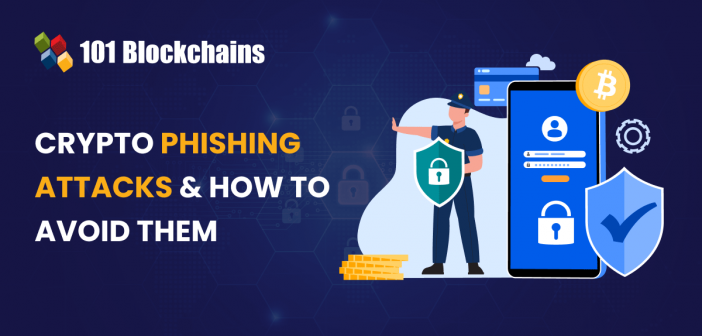Learn how blockchain truly works, master key definitions, and uncover what makes smart contracts so "smart." Dive into the fundamentals, gain valuable insights, and start your blockchain journey today!

- Cryptocurrency
James Howell
- on June 10, 2022
Most Common Crypto Phishing Attacks and How to Avoid Them
The history of scams in financial assets goes back a long way before the origins of blockchain technology and cryptocurrencies. The same is also applicable for phishing scams when it comes to the domain of cybersecurity. Crypto phishing scams basically revolve around the premise of duping unsuspecting victims of their money or confidential information.
The growing rate of crypto phishing attacks in recent times has created a lot of hype around crypto security. As the popularity of cryptocurrencies increases and more users want to capitalize on these new digital assets, the risks of phishing scams have escalated by unreal margins. On top of it, the threat of phishing scams in crypto can be quite critical as cryptocurrencies facilitate better privacy protection.
How can you identify crypto phishing scams and deal with them? The following discussion helps you discover some of the most common phishing scams in the crypto space. In addition, you can also learn about the remedial measures for each type of phishing attack. Most important of all, you can also identify the best practices for safeguarding your crypto assets from scams.
Why Should You Worry about Crypto Scams?
The traits of blockchain and cryptocurrencies guarantee that they would have better security and safeguards against unwarranted access. However, it is important to think of situations when you are tricked into revealing the private key to your cryptocurrencies. This is why the need to avoid crypto scams has become quite prominent in recent times, as the adoption of cryptocurrencies continues to increase. First of all, avoiding scams in crypto can help you protect valuable crypto assets. However, the most pressing need to avoid phishing scams in crypto focuses on driving the large-scale adoption of cryptocurrencies.
Phishing scams can discourage investors from trying their hand at cryptocurrencies ever again. Subsequently, the influence of crypto attacks can result in a far-reaching impact on the general perception of the crypto domain. The impact of crypto crime made an indelible mark on the crypto space in 2021, with losses of around $14 billion of assets.
In the previous year, scammers looted crypto assets worth $7.8 billion in 2020. The radical growth in cryptocurrency interest has also invited the attention of expert scammers towards the crypto holdings of users. Experts have suggested that the technical complexity of blockchain and cryptocurrencies would bring sophisticated scammers into the game. How can you stay away from them?
Want to become a Cryptocurrency expert? Enroll Now in Cryptocurrency Fundamentals Course
Common Phishing Attacks in Crypto
The losses in crypto phishing attacks have been quite substantial to garner attention. According to the Federal Trade Commission of the US, people lost more than $80 million within six months from October 2020 to March 2021. Crypto investment scams and phishing scams are rampant, and the only way to deal with them is to identify them. When you know a scam in and out, you can definitely figure out when you are being played in one. Here are some of the most common phishing attacks in crypto you should be careful of.
-
Spear Phishing
The first entry in a discussion on “How to avoid crypto phishing attacks” would focus on spear phishing. According to a report by data protection agency Barracuda Networks, spear-phishing attacks have been growing in number. Spear phishing attacks involve hackers focusing on specific individuals with customized messages.
For example, a fake email is supposedly coming from a popular organization or individual. The aim of the attacker in such crypto phishing scams is to trick the victims into revealing sensitive information. In some cases, the attackers can also dupe victims into clicking on links to a malware-filled website.
In the case of crypto, spear-phishing attacks may come in the form of emails or text messages from renowned wallet providers. For example, an email or text message from a crypto wallet provider asking users to update their seed phrase. Once you click on the link for updating your password or seed phrase, you give away your credentials to the hacker. Spear phishing scams in crypto can also involve enticing users into attractive promotions.
Is there any way to avoid crypto scams like spear phishing? Enterprises can try out multiple solutions for safeguarding their crypto assets from spear-phishing attacks. Here are a few solutions for enterprises to avoid spear phishing attacks in crypto.
- Using machine learning for identifying communication patterns.
- AI tools for facilitating account-takeover safeguards.
- Improved employee awareness and training on reporting basics.
Individuals can rely on the following steps for safety from crypto phishing attacks like spear-phishing,
- Implement two-factor authentication.
- Avoid unprotected Wi-Fi networks.
- Careful verification of sender email addresses and links.
- Validating the authenticity of senders.
- Avoid emails that ask for log-in credentials or passwords.
Get familiar with the terms related to cryptocurrency with Cryptocurrency Flashcards
-
Fake Browser Extensions
The second prominent entry among common crypto attacks through phishing refers to fake browser extensions. Crypto users use different types of browser extensions along with MetaMask wallets or other crypto wallets. While the wallet browser extension serves flexibility for crypto users, it can be an easy target for attackers.
Cybercriminals are using fake browser extensions of crypto wallets to dupe users of their funds. The fake browser extensions can help in capturing log-in credentials for the user’s wallet. One of the examples of such an attack made news last year with more than 120 downloads in the Chrome Web Store. The malicious extension for Chrome, termed Ledger Live, used Google Ads to promote the extension with feel of legitimacy.
The confusion regarding original and fake browser extensions calls for an answer on how to avoid crypto phishing attacks like these. Interestingly, you can avoid fake browser extensions with a bit of due diligence. Never trust web stores when you are looking for crypto extensions. On the contrary, invest some efforts in checking out the profile page of the crypto extension. Review the profile page of the extension to find authentic reviews and the team behind the web extension.
You can find whether the extension is authentic if the reviews and the identity of the developer team are authentic. Most important of all, you should also focus on evaluating the permissions applicable in an extension. If you find any discrepancies between the permissions required for the extension and its advertised features, step away. Another easy solution to fake browser extensions is to download one directly from the developer’s official website.
Want to know security issues pertaining to cryptocurrency and ways for resolving them? Check the detailed guide Now on Cryptocurrency Security
-
DNS Hijacking
The complexity of crypto phishing scams has been growing by humongous margins in recent times. DNS hijacking is one of the most unrecognizable scams which might take a keen eye for detail to notice. DNS hijacking or DNS spoofing attacks are quite old in which attackers hijack authentic websites. The attackers then replace the authentic website with a fake interface.
Unsuspecting users can use their log-in credentials and their private keys on the fake website, thereby compromising their crypto assets. The most recent example of crypto scams with DNS hijacking involves two popular DeFi solutions. Cream Finance and PancakeSwap suffered through a DNS spoofing attack, albeit without any clear details regarding the loss.
How can you stay safe from DNS spoofing attacks? You can deal with DNS hijacking attacks in the crypto space by using a VPN. It can help in bypassing the router’s settings, thereby ensuring information transfer through an encrypted channel. In addition, you can avoid crypto scams like these with due diligence in verifying the URL in your browser. Make sure that the website has a trusted certification, and look out for warnings about insecure connections to a website. Most important of all, you can rely on an offline hardware wallet to avoid the risk to your crypto assets in online DNS spoofing attacks.
Curious to know about top crypto wallets which serve as the ideal solution for simplifying access to your crypto assets? Check the detailed guide on An Exclusive List Of Crypto Wallets
-
Phishing Bots
The final and most interesting entry among the popular crypto phishing scams points to phishing bots. It is important to note that phishing bots have been implemented in the past to various extents. However, the use of phishing bots in crypto is primarily directed at compromising the valuable seed phrases of users. The crypto wallet MetaMask called for the attention of users towards a phishing attack being carried out in its name.
MetaMask informed users that a group of phrase-stealing bots on Twitter were responsible for the phishing attack. Apparently, the phishing attack comes from an account looking almost the same as that of MetaMask. The request calls for filling a support form on major sites such as Google Sheets or seeking the secret recovery phrase of users.
How will users avoid phishing bots? Interestingly, the ingenuity of the scam in using phishing bots can be a tough puzzle to crack. Many of you must have thought of verifying the origins of the message from an official account. Yes, you can invest every ounce of effort in checking whether a message comes from a reliable website.
However, there is practically no way to figure out instantly that the original website or the page has been hacked. Many social media accounts have been hacked in the past, and the biggest example is that of Twitter in 2020. Considered one of the sneakiest crypto attacks, the hack led to theft of Bitcoin worth $121,000.
In addition to these common examples of phishing attacks in crypto, you must be careful of some other notable attacks. Here are a few significant crypto scams you should be careful of at all costs.
- New assets or projects demanding payments only in crypto.
- Anonymous or fake identities.
- Shady digital collectibles and games.
- Ponzi and pyramid schemes for crypto investment.
The variety of scams and potential attacks in the world of crypto can be quite overwhelming for beginners. Therefore, it is important to look for the best practices to avoid such scams.
Want to get an in-depth understanding of crypto fundamentals, trading and investing strategies? Join the Standard & Premium Plans and get free access to Crypto Fundamentals, Trading And Investing Course.
-
Best Practices for Safety from Scams
The outline of common crypto phishing attacks alongside the best practices for dealing with them can improve your resilience towards such attacks and scams. However, you must abide by the following pointers to stay safe from cryptocurrency scams.
- Look for typo errors and misspellings in social media posts or messages.
- Identify hints of psychological manipulation tricks such as blackmailing and extortion.
- Avoid unreal promises of free monetary rewards or massive profits.
- Stay away from fake celebrities or crypto influencers.
- Don’t enter into contractual obligations for locking your crypto assets.
Get familiar with the terms related to cryptocurrency with Cryptocurrency Flashcards
Bottom Line
The final overview regarding the discussion on “How to avoid crypto phishing attacks” ultimately rounds up importance of due diligence. As crypto users, you have to be more vigilant than ever when it comes to handling crypto transactions. At the same time, you must stay alert for any suspicious emails, text messages, or links on your devices. A closer look at each phishing attack in the crypto domain could help you know the threat before it actually causes any trouble.
Cryptocurrencies are gradually moving beyond the conventional boundaries of financial applications into many other use cases. Safety from the common phishing attacks will not only safeguard your assets but also encourage trust in the crypto space. Learn more about blockchain security and cryptocurrency security with experts and figure out the advanced best practices right now.
*Disclaimer: The article should not be taken as, and is not intended to provide any investment advice. Claims made in this article do not constitute investment advice and should not be taken as such. 101 Blockchains shall not be responsible for any loss sustained by any person who relies on this article. Do your own research!






